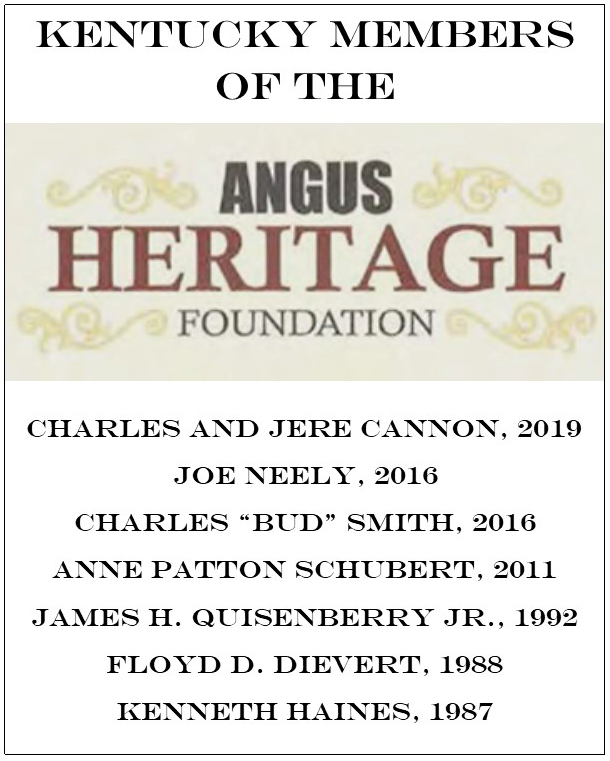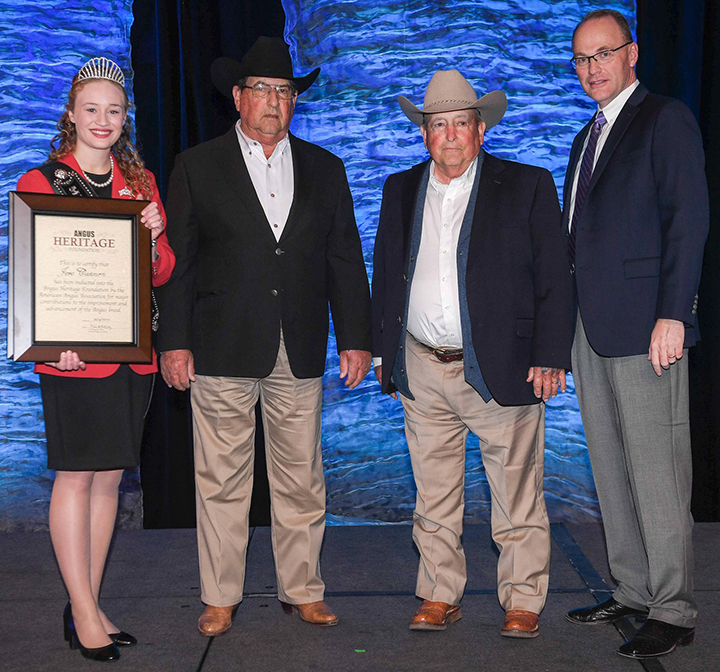NOV
Fleming County Brothers Join Ike, J.C. Penney in Angus Shrine
Cannon Brothers Pride Themselves on Customer Service
By CHRIS ALDRIDGE, Kentucky Agricultural News

FLEMINGSBURG, Ky. (Nov. 29, 2019) — Two Kentucky brothers, Charles and Jere Cannon, are new members of a select club whose members include former President Dwight D. Eisenhower and retail store magnate J.C. Penney.
The Cannons were among four new members inducted into the Angus Heritage Foundation Nov. 4 during the 2019 Angus Convention in Reno, Nevada. That increases the number of Kentuckians to eight in the 219-member organization, which honors innovators and visionaries who have made significant contributions to the advancement of the Angus breed and American Angus Association programs.
Both brothers admitted they were surprised when they received a phone call informing them of the honor.
“It’s very much appreciated by our family,” said Charles, who was elected to the American Angus Association board of directors in 1974, then became its president in 1982. He is also a former president and board member of the Kentucky Angus Association.
Charles is three years older than Jere and a founding member of the Kentucky Cattlemen’s Association. Jere laughed and said the recognition by the national association “never entered my mind.”
The Cannons joined the national association in 1953 as Cannon Brothers, which they renamed Stone Gate Farms a couple of years later describing the entrance to their Fleming County farm. Stone Gate was selected as the Kentucky Angus Association Breeder of the Year in 2006 and received the Kentucky association’s Historic Herd Award in 2008.
Stone Gate’s purebred herd can be traced back to 1952, when the brothers bought three Angus heifers, intending to produce a few steers to show for a 4-H Club project.
“We used to show steers,” Jere remembered. “That’s the main thing we did as kids. That’s where the money came from for the breeding stock.
“It’s been a long run,” Jere said of their family business, which is nearing its seventh decade in operation.
“It seems like a long time, but it passes quicker than you think,” Charles added.
The biggest changes the brothers have seen in the business is the way breeding stock is selected.
“When we started out, cattle were selected on eye appeal alone,” Charles said. “Eye appeal is still important, but now there are so many other factors involved, so many ways to rate the cattle. It’s an entirely different ballgame from 60 years ago, or even 10 years ago.”
In 1957, the Cannon brothers enrolled Stone Gate’s growing herd in a performance program through the University of Kentucky. In today’s purebred cattle world, sophisticated performance programs are the norm. But 62 years ago, they were new, controversial, not necessarily well accepted, and relatively primitive.
The results, however, speak for themselves.
Stone Gate’s herd numbers 400 registered cattle and 200-300 commercial cattle. The farm hosts two sales per year: a bull and commercial female sale in the fall and a spring sale of registered cattle.
“Certified Angus Beef made a big difference,” Jere said of the branding program, which began in 1978. “It created a stronger demand for Angus seedstock.”
Both brothers attributed the key to their success in the cattle business to customer service.
“I think we’ve tried to breed the best cattle we possibly can and stand behind our cattle in the best way,” Charles said. “Any good business has to stand behind its product and make sure its customers are satisfied.”
If Stone Gate receives a complaint, Charles said, the customers are given their choice of another bull or their money back. “That doesn’t happen often,” he added, noting 70 percent of Stone Gate’s business comes from current customers.
“We make sure the cattle are what we say they are,” Jere said. “There’s nothing like satisfied repeat customers.”
“You sell somebody some cattle, and they tell their neighbor and their family, and it just grows from that,” Charles said. “We advertise in Cow County News and some Angus magazines, but word of mouth is hard to beat.”
Looking to the future, Jere is worried about the effect that lab-grown meat may have on Stone Gate’s livelihood, which will be passed to his and Charles’ children.
“I don’t know what this artificial meat is going to do to us,” Jere said. “It tore up the milk industry.”
Jere was referring to plant-based products currently being sold as “milk” made from soybeans; coconuts; nuts such as almonds, cashews, and macadamias; oats; rice; quinoa; and even hemp.
Kentucky Agriculture Commissioner Ryan Quarles made House Bill 311, which Gov. Matt Bevin signed into law on March 21, his legislative priority during the 2019 session of the General Assembly. The law amends KRS 217.035 to define misbranded food to include any food product that purports to be or is represented as meat or a meat product that contains any cultured animal tissue produced from in vitro animal cell cultures outside of the organism from which it is derived.
“Companies are investing millions of dollars into it,” Jere said of lab-grown meat. “That’s the biggest question mark right now.”

2019 Miss American Angus Madison Weaver and American Angus Association CEO Mark McCully, right, present plaques to Charles, second from left, and Jere Cannon recognizing their membership in the Angus Heritage Foundation in November in Reno, Nevada. (Photo courtesy of American Angus Association)

